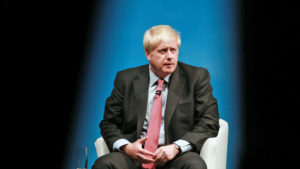“I have been a foster carer for over 14 years and have never sexually assaulted anyone. I am happily married to Janet.” Paul Bickerdike secured 102 votes when he stood for the Christian People’s Alliance in last July’s by-election in Batley and Spen. Almost a year later, he is pinning his hopes on winning Wakefield, where, as the first line of his campaign leaflet makes clear, he does have one thing going for him: unlike the city’s last member of parliament, he is not a paedophile.
When that MP, Imran Ahmad Khan, was imprisoned last month for sexually assaulting a 15-year-old boy, over a century had passed since wardens at HMP Wakefield coined the term “nonce”. Ahmad Khan defied political history by winning the seat in 2019; three years later, history took its revenge.
Wakefield had been Labour’s since 1932. In Mary Creagh, it had a reliable Labour MP whose popularity had shown no sign of waning since she was elected in 2005. But then two-thirds of Wakefield voted for Brexit, Creagh said she would be a Remainer until she dies, and the Tories spotted an open goal. Wakefield was theirs for the taking. It didn’t matter who was on the ballot. It didn’t matter that nobody in Wakefield knew who Ahmad Khan was. It didn’t even matter that, just days before the vote, party officials were warned that their man was a nonce.
“I’m ashamed that someone from Wakey was done for doing something like that,” Sharon Horncastle, 60, tells me. “I had two lads from Labour come knocking on my door to ask if I’d vote for their man. I just told them: ‘It depends if he’s a paedo or not.’”
Horncastle didn’t vote in 2019, because “they’re all shit”. But this time round, she feels she doesn’t have a choice. “I have to vote Labour. The Conservative here got done for being a paedophile. How could I vote for them?” Is that the only reason you’ll vote Labour? “There’s Boris’s lockdown parties, too. While he was doing that, my mum died of Covid. There’s five of us children but only one person could go and see her on her deathbed. But of course Keir Starmer was at it too. They’re just as bad as each other.”
But will voting Labour make her life better? “No,” she says immediately. “I work at Morrisons. I can see how everyone is now struggling. People can’t afford their shopping. We need an MP who’s going to make a difference. But what choice do I have?”
In Wakefield city centre, the extent of that choice swiftly becomes clear. It is Market Day, and the political offering is meagre. Neither Labour nor the Conservatives can be bothered to campaign. They leave that to the lesser parties.
A gaggle of supporters from Reform UK, the Brexit Party’s disappointing second album, squawk about cutting taxes. Campaigners from the local Freedom Alliance party silently hand out leaflets, then watch them be discarded in the bin a few metres away. Over the road, a collection of photographers stare expectantly at the cathedral looming over the square. I ask which political Big Beast is about to emerge: Angela Rayner? David Davis? Liz Truss? “Oh no,” I’m told. “We’re not here for that. There’s a peregrine falcon nesting in the spire.”
A megaphone attached to a crawling black cab interrupts our conversation. Ukip have arrived. “Are you tired of Westminster?” its candidate booms from his… black cab. An hour later, the car returns to the city centre, this time blasting out Dusty Springfield. By lunchtime, the party has moved on to Adele. I spot the car again later parked outside Wetherspoon’s: one of its passengers is arguing with a Stand Up To Racism campaigner over who is more fascist.
The by-election circus is yet to arrive in Wakefield’s suburbs. “I’ve got my postal vote, but we’ve had no canvassers knocking on our door,” Deanne tells me on the city’s Peacock Estate, where a third of households live in fuel poverty. “We’ve had no leaflets either.” Deanne, an NHS worker, voted for Labour in 2019, but is yet to make her mind up. “The Labour candidate talks about buying his first house in Wakefield, but when the ballot paper came through, it turned out he lives in another constituency.” Is that enough to make her vote Tory? “I don’t think so. There’s all the nastiness with the last MP. And then there’s Boris — how is he still even around? If I’d done something like that, I’d be out the door.”
Anthea Ambleton, who lives around the corner from HMP Wakefield, doesn’t need a leaflet or canvasser to sway her vote. “The Partygate scandal is bad enough,” she tells me. “But I used to work in child protection, so I was absolutely furious with their last MP. I don’t know why the Tories let that git stand last time when there were all those rumours circulating about him.”
Yet the reason is depressingly straightforward: three weeks before Imran Ahmad Khan was elected, another “git” was lined up to be Wakefield’s next Tory MP. However, Antony Calvert’s campaign came crashing down at the last minute. Not because he was caught sneering at a working-class constituent for going to Costa. It was tweets that did for him — a cocktail of misogynistic remarks about Mary Creagh and racist jibes about Bradford.
And so the Conservatives parachuted in Amhad Khan from his mansion in the Lake District, along with an election agent who had once been hired by an American prison to teach staff how to execute people by hanging. It didn’t matter that Ahmad Khan was rumoured to have already applied to stand in Wakefield and not been selected for interview. The Tories could afford to be complacent: Labour still had Corbyn and Brexit was still infused with hope. Even a nonce and a hangman could get the job done.
Three years later, even with Partygate, even with Ahmad Khan in jail, a whiff of that complacency lingers. It doesn’t matter whether you live in Wakefield (a paedophile) or Tiverton (penchant for tractor porn): the selection of unsuitable candidates has always been a symptom, not a product, of the Conservative Party’s nihilistic lack of direction. In Wakefield, it now takes the form of Nadeem Ahmed.
Ahmed is an improvement on his predecessors, though the bar is low. He is a local candidate (unlike Khan), and he is capable of restraining himself on Twitter (unlike Calvert). But politically, he is a failure: despite serving as the Conservative group leader of Wakefield Council since 2014, he was forced to quit last July after losing a vote of no confidence at a party meeting. Ahmed’s colleagues deemed him too incompetent to represent them on the council. Yet here he is: hoping to represent 70,000 people in Westminster.
Ahmed bristles when I ask why he thinks a failed council leader deserves to be Wakefield’s next MP. He deflects; he pretends he can’t hear me; he makes excuses. “I didn’t want to be group leader anymore”; “I always wanted to pass on the leadership”; “I wasn’t feeling well at the time”; “the story was spun by the Wakefield Express and Labour”.
So I ask directly: did he lose a vote of no confidence last July? There is silence. Is he going to lie? He is. “No,” he says. “There was no vote of confidence.” I tell him that I’ve spoken to a Tory councillor in the room at the time who watched him lose, but still he denies it. Perhaps he knows that it’s too late, that Boris Johnson has already “priced in” the fall of Wakefield, and that he has nothing to lose. Or perhaps he thinks it simply doesn’t matter. After all, at least he’s not a nonce.
The Labour candidate who will win Wakefield is Simon Lightwood, though it should have been someone else. During his campaign to become Labour leader, Keir Starmer called for the party’s selection process to be “more democratic”. Labour “should end NEC impositions of candidates”, he said, and “local party members should select their candidates”. But two years is a long time in Labour politics, and Starmer’s call for more democracy has given way to iron-clad bureaucracy.
When the by-election was announced, roughly 25 Labour candidates put their names forward. Only three lived in the constituency, including a popular local councillor who had already been through the party’s Future Candidate programme. “He didn’t even make it on to the shortlist of four,” a member of the local party told me. “Normally, the candidate is decided by a panel of five people — three from the local party, one from the NEC and one from the unions. But this time, Labour HQ put a stop to this.” There was only one local representative and three from the NEC, who effectively block-voted to whittle it down to two alternatives. “Neither of them were from the constituency and both were anti-Brexit. Lightwood doesn’t even live in the constituency. This is the fifth place he’s tried to be nominated.”
Pushed aside by the party machine, the 16 members of the Wakefield constituency Labour party resigned. “After Corbyn, it’s control gone mad,” one of them told me. “We are having nothing to do with it. The local constituency party, many of them Labour councillors, are refusing to campaign. Look at Lightwood’s campaign photos and you’ll hardly see any locals in them. He’s having to ship in canvassers from London and MPs to knock on doors.” Will any of this affect the result? “Labour will win but it won’t be meaningful: if you can’t defeat a party whose last candidate is a convicted paedophile, then you’re really shit.”
Lightwood will win — though it seems unlikely he will match the 23,000 votes secured by Creagh in 2017, or the 21,000 by Ahmad Khan in 2019. That would require there to be enough people willing to vote for him, rather than simply against Johnson and Ahmad Khan. “I’ve seen them come and go,” Susan Albrighton, 70, tells me. “And nothing gets better. Even with Brexit, which I voted for, nothing has really changed. The leaders are all as bad as each other.” It’s hard to find anyone who has a good word to say about Starmer: “He’s just like the rest of them”; “he doesn’t stand for anything”; “he’s better than Corbyn, but that’s not saying much”.
This by-election, then, is a tale of political failure: of the Conservatives winning a Labour stronghold for the first time in 87 years and then handing it over to a paedophile; and of Labour losing Wakefield — once home to the man who introduced communism to Britain — in the first place, and then winning it back without needing to make amends. This isn’t a battle of politics, or of great ideas. It’s a procedural game, where the least-worst candidate wins and the voters always lose.
In 1967, Wakefield’s Mayor boasted of living in an “industrial city with much of the air of a country town”. Fifty-five years later, Wakefield’s industry has disappeared. It is now just a small city like any other in Britain: home to a boarded-up high street, a glistening centre on its periphery, a bus system that doesn’t work, and a population concerned they won’t be able to put food on the table. As Rob Morris, 61, told me: “I don’t care who wins. I’m past caring now. I can’t afford to.”
This is the consequence of systemic negligence: a city in stasis; its residents resigned to the fact that nothing will get better. Both parties had an opportunity to give Wakefield a voice — and squandered it. Labour handed the city to a disdainful Remainer; the Tories chose a paedophile. It’s hardly surprising that Wakefield is past caring now. Labour will win. Nothing will change. At least he’s not a nonce.
Disclaimer
Some of the posts we share are controversial and we do not necessarily agree with them in the whole extend. Sometimes we agree with the content or part of it but we do not agree with the narration or language. Nevertheless we find them somehow interesting, valuable and/or informative or we share them, because we strongly believe in freedom of speech, free press and journalism. We strongly encourage you to have a critical approach to all the content, do your own research and analysis to build your own opinion.
We would be glad to have your feedback.
Source: UnHerd Read the original article here: https://unherd.com




